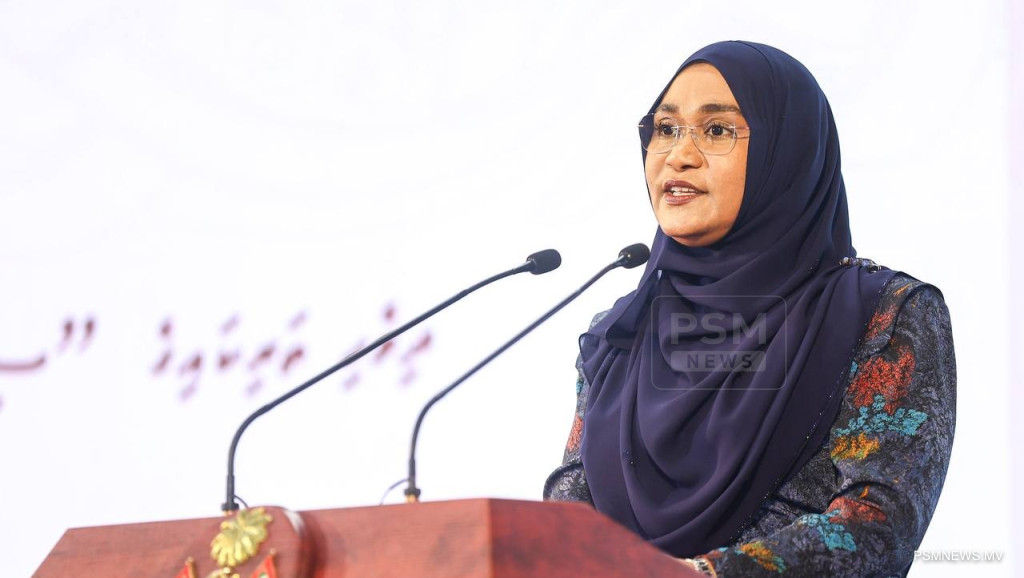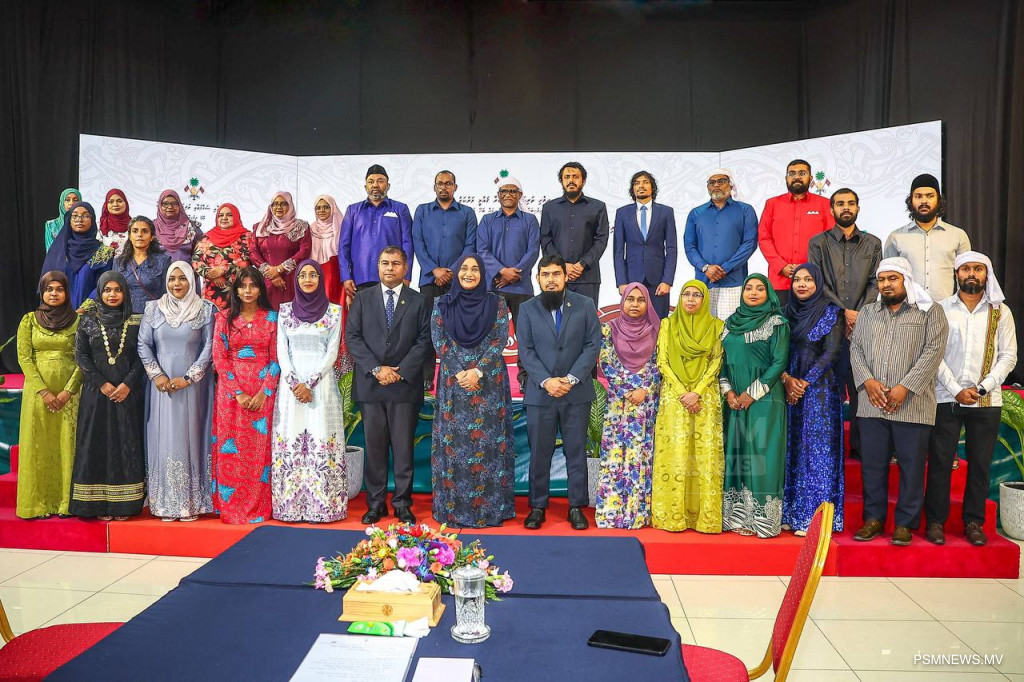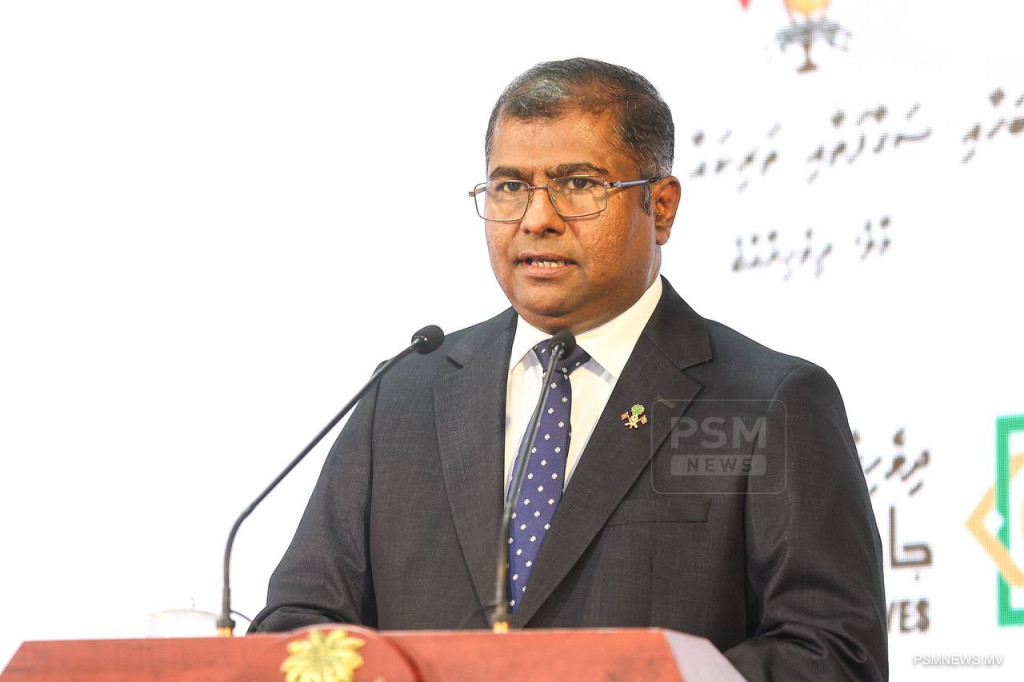
Forty new research scholarships dedicated to the study of Maldivian culture and heritage were awarded this week, with First Lady Sajidha Mohamed describing the initiative as a vital effort to safeguard national history and cultivate a generation defined by patriotism.
At a ceremony at the Islamic University of Maldives (IUM), the first lady presented the documents for the Signature Research Scholarship in heritage studies. In her remarks, she linked academic inquiry directly to national survival, highlighting the urgency of confronting the historical erosion of cultural assets.
Speaking to awardees and attendees, First Lady Sajidha underscored the profound importance of historical understanding for the nation’s future. She stressed that for Maldivians to endure as a distinct people and as a sovereign nation, the significance of the country’s history must be grasped and followed by concerted action.
Her concern centred on the extensive loss and destruction of heritage that has historically afflicted the country, despite its richness in cultural wealth. This erosion, she noted, encompasses both tangible and intangible assets, including the disappearance of ancient Maldivian stories and the deterioration of structures such as coral stone mosques.
The first lady also warned that the Maldivian mother tongue is under strain, pointing to a trend in which citizens achieve fluency in foreign languages without a corresponding comprehension of their own history and heritage. “Our mother tongue is also being significantly affected. We are witnessing fluency in foreign languages. However, this occurs without a corresponding comprehension of Maldivian history and heritage,” she said.
She continued, “I often wonder whether those who ought to grasp the significance of this matter truly comprehend its importance.”
Her remarks extended to international precedents, questioning whether those responsible for safeguarding cultural continuity truly appreciate its weight. She observed that other nations undertake extensive measures to ensure generational proficiency in their own languages and traditions. “Conversely, other nations undertake extensive and continuous efforts to build generations proficient in their own language and cultural traditions,” she said.
The first lady noted that the path forward must be grounded in Maldivian religion, culture, customs, and history. Considerable work lies ahead, she noted, stressing the need to guide future generations by illustrating the solid foundations of Maldivian moral character, industriousness, and specialised skills.
She affirmed that the nation awaits new generations who are self-reliant, unique, passionate, brave, and patriotic. “This nation awaits unique Maldivian generations who are self-reliant, passionate, brave, and deeply patriotic,” she said. “It is essential that we rediscover both commendable Islamic moral character and the beautiful customs of the Maldivian people.”
The scholarships, she explained, represent a crucial first step in instilling the capacity to scientifically observe and appreciate both the tangible and intangible heritage of the Maldivian nation. She concluded by framing the initiative as a valuable effort to build a generation that loves the Maldivian nation.

The Signature Research Scholarship initiative is a government-supported programme designed to strengthen national identity and capacity in heritage studies. Forty scholarships were awarded in this round, each focused specifically on Maldivian culture and heritage.
Sponsored by the National Institute for Maldivian Heritage Research, the scholarships enable recipients to pursue a master’s in research and publication programme at the Islamic University of Maldives. According to the institute, the programme’s primary goal is to generate knowledge about Maldivian heritage and to produce capable professionals in the field.
The overarching objective is to facilitate and publish research within the heritage sector, prioritising the academic, intellectual, and distinctive aspects of Maldivian national identity. Scholars receive full coverage of their course fees, funded by the institute. The research component spans two years, during which participants must dedicate two days each month to academic work at the institute. In addition to acquiring deep, scientific knowledge in heritage studies, participants will have the opportunity to publish their findings.
This push for heritage research directly supports a key commitment made by President Dr Mohamed Muizzu. Restoring Maldivian national identity was named one of the most important pledges in his first presidential address. Last year, a national project to restore identity was launched, offering opportunities to 50 researchers. In this year’s presidential address, the president reaffirmed his priority, promising to continue paving the way for research in the heritage field.
Minister Adam Naseer describes heritage scholarships as revolutionary step in national identity restoration
Adam Naseer Ibrahim, the Minister of Dhivehi Language, Culture and Heritage, described the newly awarded scholarships as the beginning of a revolutionary scholarly effort by the government, aimed at scientifically revitalising Maldivian heritage and culture. He stated that the project is closely linked to President Dr Mohamed Muizzu’s national goal of restoring Maldivian nationhood.

Minister Adam Naseer announced that the initiative is expected to deliver significant progress in the fields of Maldivian heritage and culture. While acknowledging that past efforts have contributed to safeguarding the heritage sector, he highlighted that the current endeavour is fundamentally different, qualifying it as a revolutionary scholarly undertaking tied directly to the president’s policy announced upon taking office.
He explained that the necessary change for the heritage sector involves conducting academic research and disseminating information based on scientific findings. The minister noted that this effort, which includes 40 scholarships specifically dedicated to heritage studies, forms part of broader work aimed at advancing the field.
The core objective of the initiative, according to the minister, is to advance the work of shaping the national mindset through the policy announced by the president. He stressed that the research would focus on uncovering the truth of Maldivian heritage in a way that aligns with the Maldivian people. Critically, he stated that this work is intended to enable Maldivians to reach areas in discovering their historical origins that have remained inaccessible for generations.
The minister outlined a long‑term vision centred on preserving and transmitting heritage to subsequent generations. Aligning with the president’s policy, he affirmed that the ancient heritage of Maldivians, encompassing both material and intangible elements, will be introduced into the lived experiences of today’s and future generations through the most modern means available.
Vice Chancellor of the Islamic University of Maldives (IUM), Ali Zahir, also addressed the ceremony. He affirmed that the university has significantly broadened its research scope over the past two years. He stated that IUM’s current trajectory involves expanding research and transforming the institution into an internationally reputable university.
